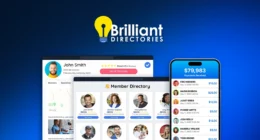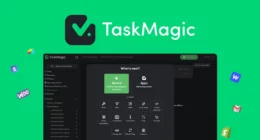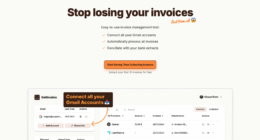QuickBooks Online leads the pack for small business accounting software, offering robust features and automation at $35-235 monthly. For budget-conscious businesses, Wave provides free basic accounting tools, while FreshBooks ($19-60/month) excels for service-based companies. Xero ($20/month) stands out for international operations with multi-currency support. The best choice depends on business size, industry, and specific needs. Exploring each platform's unique capabilities reveals which solution will maximize financial efficiency.
Quick Overview
- QuickBooks Online leads small business accounting solutions with automated invoicing, expense tracking, and scalable features from $35-235 monthly.
- Xero provides comprehensive accounting tools with multi-currency support and extensive third-party integrations starting at $20 monthly.
- Wave Financial offers free accounting software ideal for micro-businesses and solopreneurs with basic bookkeeping and invoicing needs.
- FreshBooks specializes in service-based businesses, featuring time-tracking and professional invoicing capabilities from $19-60 monthly.
- Small businesses should prioritize software with robust reporting, cloud accessibility, and integration capabilities with existing business tools.
Understanding Your Small Business Accounting Software Needs

When selecting accounting software for a small business, understanding specific needs and requirements serves as the crucial first step toward making an informed decision. Business owners must carefully evaluate their operation's size, complexity, and industry-specific demands to choose the right solution.
For sole proprietors, basic software offering simple invoicing and expense tracking may suffice. However, growing businesses often need more robust features like multi-user access, advanced reporting, and payroll capabilities. Modern cloud-based solutions like Xero allow businesses to manage their financial data anywhere, eliminating geographical constraints. Companies managing multiple business entities should consider solutions like multi-entity management options available in Sage Intacct for streamlined operations.
Key considerations should include:
- Current transaction volume and expected growth
- Number of employees needing system access
- Industry-specific requirements (such as VAT compliance)
- Integration needs with existing business systems
- Budget constraints and available resources
The right software should offer scalability to accommodate future growth while providing essential features for current operations.
Top Accounting Software Solutions in the Market
While the accounting software market offers numerous options, several industry-leading solutions have emerged as top choices for small businesses based on their reliability, features, and user satisfaction.
QuickBooks Online leads the pack with thorough features and automated invoicing, making it suitable for growing businesses. With its expense management tools, the software helps small businesses track and categorize financial transactions efficiently.
Xero stands out for international operations with its multi-currency support and extensive app integrations. The platform's strong automation tools streamline financial workflows and reduce manual data entry for businesses of all sizes.
For enterprise-level needs, NetSuite offers advanced financial planning and multi-subsidiary management.
Budget-conscious businesses can turn to Wave, which provides free accounting tools and basic reporting capabilities.
Service-based businesses often prefer FreshBooks for its specialized features like time-tracking and professional invoicing.
Each solution caters to different business needs, from basic bookkeeping to complex financial management, allowing small businesses to choose based on their specific requirements and growth plans.
Cost Analysis and Value Comparison

Understanding the cost structure of accounting software represents an essential step for small businesses seeking to make informed financial decisions. The market offers various pricing models, from subscription-based services to one-time licenses, each with distinct advantages for different business needs.
Selecting the right accounting software pricing model enables businesses to align financial tools with their budgetary constraints and operational goals.
- Cloud-based solutions typically cost $10-50 monthly, offering lower upfront costs and better scalability than traditional on-premises options.
- Popular platforms like QuickBooks Online ($35-235/month) and Xero ($20/month) provide extensive features for growing businesses.
- Free alternatives like Wave Financial suit smaller operations, while FreshBooks ($19-60/month) caters to service-based businesses.
- Additional costs may include setup fees, data migration, customization, and ongoing maintenance support.
Modern cloud platforms like Xero offer unlimited user access for improved collaboration with accountants and business advisors. Business owners should carefully evaluate these options against their specific requirements, considering both immediate costs and long-term value. Businesses choosing subscription-based software benefit from automatic updates and upgrades through vendor-managed maintenance, eliminating the burden of system upkeep.
Essential Features to Look for in Accounting Software
Selecting the right accounting software requires careful evaluation of essential features that can streamline financial operations and support business growth. The core accounting features should include robust transaction recording, automated financial statements, and real-time bank syncing.
Key functionalities to prioritize include:
- Payment processing with multiple payment options
- Customizable invoicing with company branding
- Extensive expense tracking and analysis
- Detailed financial reporting and analytics
- Strong security measures and data backup
Look for software that offers scalability to accommodate business growth and cloud-based access for remote work flexibility. The system should also provide user-friendly dashboards and reliable customer support. With approximately 14% of small businesses falling victim to cyberattacks in 2021, choosing software with comprehensive security features is crucial. For businesses seeking advanced capabilities, Microsoft Dynamics 365 offers robust financial planning tools that integrate seamlessly with other Microsoft applications.
Machine learning capabilities can offer valuable insights into financial trends and help predict future performance, making it easier to make informed business decisions.
Integration Capabilities and Ecosystem Support

Modern accounting software must seamlessly connect with other business tools to create a unified operational environment.
Today's small businesses need accounting solutions that can integrate with various systems, from payment processors to inventory management tools. This connectivity guarantees smooth data flow and reduces manual work. Two-way data exchange between integrated systems ensures information stays current and accurate across all business operations. Sage 50 Accounting offers robust integration features specifically designed for small business operations.
Key integration capabilities to look for include:
- API connections that allow automatic data sharing between different business applications
- Built-in payment processing integration for streamlined transaction handling
- Real-time synchronization with inventory management systems
- Compatibility with popular CRM platforms and business tools
Leading platforms like QuickBooks Online, Xero, and NetSuite offer extensive integration libraries and robust ecosystem support.
These solutions provide access to industry-specific add-ons, vendor networks, and user communities that help businesses maximize their accounting software investment.
Frequently Asked Questions
Can I Switch Accounting Software Mid-Year Without Losing Historical Data?
Yes, switching accounting software mid-year is possible while preserving historical data. The key is proper planning and execution.
Essential steps include:
- Creating thorough data backups
- Setting a clear cutoff date
- Verifying software compatibility
- Using data migration tools
For best results, consider switching at the start of a fiscal quarter.
Professional guidance may be helpful, and most modern accounting platforms offer built-in tools to facilitate smooth data transfer between systems.
How Long Does It Typically Take to Train Staff on New Accounting Software?
Ever wondered why some teams adapt to new software faster than others?
The typical training time for accounting software ranges from 35-50 hours, but this varies based on several factors.
System complexity, staff's prior experience, and software customization all impact the timeline.
Simple systems like QuickBooks may require just 20-30 hours, while complex ERP systems could need 60+ hours.
Breaking training into manageable sessions over several weeks typically yields the best results.
What Happens to My Financial Data if the Software Company Goes Bankrupt?
When a software company declares bankruptcy, user data protection typically falls under legal safeguards.
Most companies have data protection protocols that guarantee client information remains accessible and secure.
Users should regularly back up their financial data locally and review their service agreements for data ownership rights.
If bankruptcy occurs, users usually have time to migrate their data to another platform while the company undergoes reorganization or liquidation proceedings.
Do These Accounting Software Platforms Work Internationally With Multiple Currencies?
Like a medieval merchant trading in multiple kingdoms, modern accounting software platforms excel at handling international currencies.
Most major platforms support 100+ currencies, offering real-time exchange rates and automated updates. Features typically include multi-currency invoicing, bank reconciliation across different currencies, and insights into currency fluctuation impacts.
The software also provides consolidated reporting capabilities, making it straightforward to manage finances across multiple countries while maintaining compliance with international regulations.
Are There Industry-Specific Versions of These Accounting Software Solutions?
Yes, several accounting software platforms offer industry-specific versions.
QuickBooks Desktop Enterprise leads with specialized editions for construction, manufacturing, retail, and nonprofits, featuring tailored tools like job costing and inventory management.
FreshBooks provides customized solutions for trades and creative professionals, while Xero offers industry adaptability through marketplace integrations.
These specialized versions include industry-specific templates, reporting features, and compliance tools to meet unique sector requirements.
Conclusion
Choosing the right accounting software is like finding the perfect pair of shoes – it needs to fit your business perfectly. By carefully evaluating your needs, budget, and growth plans, small business owners can select a solution that streamlines financial management and supports their success. Whether opting for QuickBooks, Xero, or other alternatives, the key is finding software that balances functionality, ease of use, and scalability for your unique business requirements.








